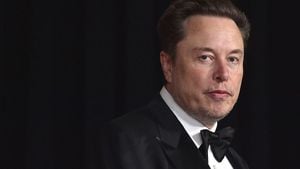India's Supreme Court made headlines recently by pausing all new legal actions pertaining to places of worship across the nation, marking another chapter in the tense interplay between religion and law. This decision, announced on Thursday, halts trial courts from registering any lawsuits related to religious sites until the Supreme Court has time to review arguments concerning the Places of Worship Act, 1991, which was enacted to preserve the religious character of places of worship as they stood on August 15, 1947.
The bench, under the guidance of Chief Justice Sanjiv Khanna, emphasized the need for stability until these petitions could be thoroughly considered. During this period, the court made it clear: no new court orders or registrations for pending cases should take place, giving those involved some much-needed breathing room. The central government has been tasked with responding to these petitions within four weeks, leading to significant anticipation over how this pivotal matter will evolve.
The crux of the concerns revolves around various Hindu groups who allege numerous mosques were unwarrantedly built on land once occupied by Hindu temples. Historical tensions over such claims have erupted violently and recently came to a head with clashes surrounding surveys of specific sites such as the Gyanvapi Mosque, the Shahi Idgah Mosque, and others, all under scrutiny from legal standpoints.
This halt emerges amid unrest linked to prior court orders. For example, the local court’s decision to permit surveying of the Shahi Jama Masjid led to tragic confrontations, sparking violence so intense it resulted in several fatalities and numerous injuries. Such turmoil not only unsettles the local community but incites political controversy on multiple fronts.
A major voice amid the political uproar is Subramanian Swamy from the BJP, who has filed one of the six petitions challenging the law. Swamy and his fellow petitioners argue these places should be reclaimed, contesting the limits posed by the Places of Worship Act.
Conversely, several lawmakers have rallied together to defend the established act, which stands against alterations to the status of religious sites as they existed almost eight decades ago. Notable figures include Jitendra Awhad from the Nationalist Congress Party (NCP) and Manoj Kumar Jha from the Rashtriya Janata Dal (RJD), both of whom push for enforcement of the law to maintain religious harmony and prevent sectarian violence.
The Supreme Court’s directive is also particularly timely due to mounting unrest revolving around specific mosques where violent claims have led to simmering tensions. The aftermath of such violence is palpable, with communities still healing from the scars left by recent events, prompting fresh discussions on the collective psyche of the populace grappling with the consequences of past injustices.
Reflecting on the recent violence, officials have taken steps to maintain order, issuing fines to local religious leaders where necessary. Following the deadly incidents last month at the Shahi Jama Masjid, officials fined the imam of Anar Wali Masjid for alleged misuse of loudspeakers. The imam faced scrutiny over the mosque's audio practices, which officials stated were obnoxiously loud. Despite the severe measures, local officials reaffirmed their intention to maintain community peace and security.
Political responses to the Supreme Court’s ruling have emerged swiftly, as various parties seize the moment to voice opinions. Congress leader Priyanka Gandhi Vadra passionately spoke against perceived authoritarian tendencies of the ruling Bharatiya Janata Party (BJP), emphasizing the need for democracy and freedom of religious expression during her speech to Parliament.
Adding fuel to the fire, the Samajwadi Party (SP) articulated their disapproval of the chaos surrounding mosque surveys, criticizing the BJP's handling of communal tensions. With multiple arrests following clashes and significant public outcry, apprehensions about civil liberty and safety are quite pronounced.
Despite the challenges, many locals and leaders express cautious optimism. The Supreme Court's foresight to pause proceedings suggests sensitivity to the delicate balance required when addressing such historical claims. There’s hope it will allow for sober reflection before sending people back to court, which could very well reduce the heat surrounding these disputes.
The legal narrative is far from over, as the next hearings promise to shed more light on these contentious issues, potentially reformulating the legal frameworks under which places of worship are litigated. For now, society holds its breath, waiting as churches, temples, mosques, and dargahs sit poised, like chess pieces at the edge of the board, anticipating the next move.
This ruling has effectively placed countless lawsuits on hold—from the Gyanvapi Mosque to the Mathura Shahi Idgah—adding to the simmering tension often leading to accusations of temples being desecrated or obliterated throughout Indian history. It not only highlights public sentiment but reflects the attempts made by some to reclaim perceived historical injustices. The Supreme Court's handling of these cases will be pivotal, not just legally but socially. The communal fabric of the nation continues to hang by threads closely woven together, all awaiting how the legal system navigates through these sensitive waters.
Looking forward, the expectations set by this ruling resonate deeply with many communities, hoping it fosters dialogue and stability, rather than discord. Religious sentiments run deep, and history hangs heavily—the road to resolution is still uncertain, and it is rightfully placed under the scrutiny of the law.



